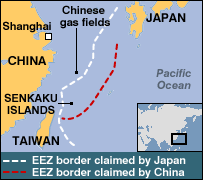 U.S., Russia revert to cold-war rhetoric over missile-defense plan
U.S., Russia revert to cold-war rhetoric over missile-defense planRussia says that the proposed US defense shield in Poland and the Czech Republic, an initial agreement for which was inked this week, is targeting Russia, not rogue states.
By Jonathan Adams
Christian Science Monitor, July 09, 2008
The verbal spat between the US and Russia came after US Secretary of State Condoleezza Rice on Tuesday inked an initial agreement on missile-defense deployment with the Czech government in Prague, as reported by the Associated Press.
According to Reuters, Russia's Foreign Ministry responded to the news in a statement: "If the real deployment of an American strategic missile defense shield begins close to our borders, then we will be forced to react not with diplomatic methods, but with military-technical methods."
In reaction to that statement, the US criticized Russia for its "bellicose rhetoric," which it said was meant to intimidate the European partners of the US into backing out of the defense plan, according to the BBC. The report goes on to clarify Russia's statement.
The BBC's Adam Brookes in Washington cites Russia's ambassador to the UN as suggesting that the phrase "military-technical means" does not mean military action, but more likely a change in Russia's strategic posture, perhaps by redeploying its own missiles.
The US has ambitious plans for a missile-defense system that would include advanced radar facilities in the Czech Republic and 10 interceptor missile sites in Poland. The US insists the shield is designed to protect against attacks from "rogue states" in the Middle East, such as Iran.
A graphic made available by Agence France-Presse maps the US missile shield as well as proposed deployments.
But Russia has strongly protested, saying the deployment of the US shield would threaten its security by blunting the capabilities of its own missile force.
Reuters adds that the US and Russia have discussed possible ways to address Moscow's worries, but that Tuesday's US-Czech deal is perceived as a step backward by Russia's Foreign Ministry.
Proposals under discussion had included stationing Russian military officers at the shield sites and providing real-time video monitoring of activity at those sites.
"Even those half-hearted promises relating to confidence-building and monitoring measures which our American partners gave us have been in effect cancelled out by them," Interfax quoted the ministry source as saying.
The Christian Science Monitor reported earlier this year that NATO governments are unanimous in backing the US missile-shield plan, though they remain deeply divided on other issues.
"There is a threat ... and allied security must be indivisible in the fact of it," read the statement on missile defense.
Public opinion in Eastern Europe is another story, however. The Czech opposition strongly opposes the plan. Writing in the Post Global section of The Washington Post website, Dana Kuchtova, the first vice chair of the Czech Green Party, says that some 70 percent of the Czech public opposes the plan to host an advanced radar facility. Ms. Kuchtova says similar percentages of Poles oppose participating in the missile-shield project. She adds that Russia is the real target of the missile shield, not Iran and North Korea, which are "at best hypothetical threats to Europe."
Though ex-satellite states hardly have a warm spot in their hearts for Russia, few Czechs appreciate being used as launching ground for a Cold War revival. And with Russia's vast oil and gas supplies, it is not in the Czechs' interest, nor in the interest of any European nation for that matter, to become Moscow's enemy.
CNN reported that before leaving for Europe this week, Ms. Rice tried but failed to reach a deal with the Polish foreign minister on deploying interceptors in Poland.
The sticking point in talks with Poland, according to the Associated Press, is that the US has not offered enough defense aid. Poland wants more protection for the proposed interceptor sites, which could themselves make Poland a target for attack. Specifically, Poland wants US antimissile defenses, including a Patriot missile battery, to be deployed alongside the 10 interceptor missile sites.
"The fundamental issue that must be resolved is in what way the American installations are going to be protected from an eventual missile attack, and in what way Poland is going to be protected from an eventual ballistic missile attack," Defense Minister Bogdan Klich said on TVN24 television.
He said the proposed U.S. system would only protect Poland from long-range ballistic missiles, leaving the country vulnerable to short and medium-range missiles.
In an opinion piece for the International Herald Tribune last year, Michael O'Hanlon, a security expert at the Brookings Institution in Washington, argued that it would be best to postpone the controversial shield rather than push it through over Russia's objections.
[The defense shield] is in principle a worthy idea, but the benefits in the short term are not worth the worsening of relations with Russia that it has already engendered.
Rather than push the idea now, when the threat of long-range missiles from the Middle East is hardly acute, it would be better to allow a new American president and a new Russian president ... to reconsider the subject in 2009 or 2010.

Original site






























